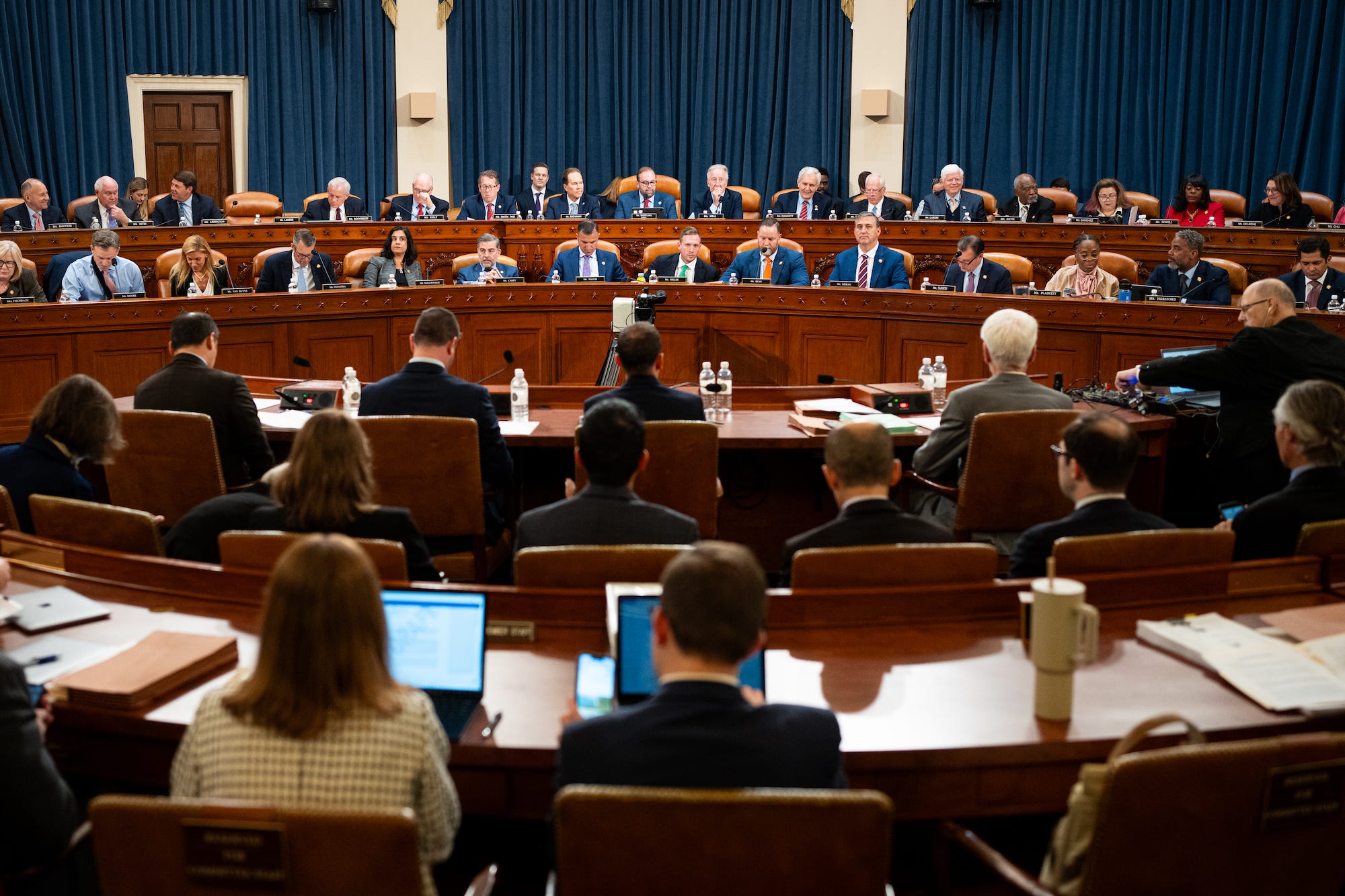
Andrew Harnik/Getty Images
For months, President Donald Trump has pursued his sweeping agenda through executive actions. Now comes the hard part.
Republicans on Capitol Hill are finally putting pen to paper on what Trump has called the “One Big Beautiful Bill,” a sweeping fiscal package that will serve as the centerpiece of the president’s legislative agenda.
The bill includes GOP priorities like no taxes on tips or overtime, cuts to Medicaid, “MAGA accounts” for children and several other provisions.
It will take weeks for lawmakers in the House and Senate to work out the final details, and it’s likely that some changes will be made along the way. Republicans hope to send the bill to Trump’s desk by July 4.
Here’s what you should know about what’s in the “One Big Beautiful Bill.”
The bill includes cuts to Medicaid, and millions could lose health coverage
As part of the plan approved by the House Energy and Commerce Committee, states would implement work requirements in 2029 for childless adults on Medicaid who do not have a disability, mandating they work for 80 hours a month.
A component of the plan would increase the price of doctors’ visits, mandating beneficiaries making above the federal poverty limit to pay co-payments of up to $35. States would also be required to stop taxing hospitals and nursing homes in order to secure more federal funding.
Medicaid recipients in some states would have more paperwork to regularly confirm their residency status and income. And the plan would lower federal funding for some recipients in states that fund medical coverage for undocumented immigrants.
The Congress Budget Office estimated the legislation would save about $912 billion over the next decade in federal spending, about $715 billion of which would derive from Medicaid and Affordable Care Act cuts. The CBO said about 8.6 million people could lose their insurance coverage.
The plan came short of expectations among some ultraconservatives who wanted more Medicaid cuts at the federal level. Some GOP leaders wanted per-capita caps for those in Medicaid expansion states and a lower across-the-board rate at which the federal government supplements each state’s funding for Medicaid programs.
Democrats have strongly opposed the bill, emphasizing that millions of Americans will potentially have their lives uprooted by Medicaid cuts.
No tax on tips or overtime, making Trump’s 2017 tax cuts permanent, and more
Some of Trump’s flashiest campaign promises were to remove taxes on tips, overtime, and Social Security. This bill largely gets those done, but only for the next four years — lawmakers will have to decide whether to renew the cuts in 2029.
The bill would allow workers in an “occupation that traditionally and customarily receives tips” to claim a tax deduction for the sum of all tips that they received in the previous year. It would also do the same for overtime wages. Neither deduction is available to anyone who is a “highly compensated employee.”
To help accomplish Trump’s “no taxes on Social Security” pledge, Republicans created a new $4,000 tax deduction for seniors making less than $75,000 per year. There’s also a provision in the bill to fulfill Trump’s promise of no taxes on car loan interest.

Bill Clark/CQ-Roll Call via Getty Images
There’s also an extension of the child tax credit, which is currently $2,000 but was set to decrease to $1,000 after this year. The bill would increase the credit to $2,500 through 2028, then it would drop to $2,000 permanently after that.
If you’re thinking of buying an electric vehicle, you might want to do so before the end of the year. The bill would eliminate existing tax credits for new and used EVs, and it would impose an annual registration fee of $250 for EV owners.
The bill also makes permanent a slew of tax cuts that Trump and Republicans enacted in 2017. The average American won’t feel much of a difference, since they’ve probably gotten used to the existing tax rates and brackets that have existed since 2018. But it’s the most consequential part of the bill from a budgetary perspective, adding trillions to the deficit over the next several years.
MAGA savings accounts
The bill establishes “Money account for growth and advancement” accounts, or MAGA accounts, for children. The idea was originally proposed by Republican Sen. Ted Cruz of Texas.
The federal government would pay $1,000 to babies born from 2024 through 2028. After the cutoff, parents will still be able to put $5,000 per year into each account.
Cruz’s proposal is similar to previous Democratic-led efforts for “baby bonds,” but the biggest difference is that there is no income cutoff. Sen. Cory Booker of New Jersey, a Democrat, envisioned a program primarily targeted at low-income families.

Kayla Bartkowski/Getty Images
A repeal of Biden’s student loan forgiveness plans
If enacted, the reconciliation bill would mean major changes for student-loan borrowers. The legislation proposes terminating all existing income-driven student-loan repayment plans, including Biden’s SAVE income-driven repayment plan, which would have shortened the timeline for debt relief and provided cheaper monthly payments. While SAVE is currently paused due to litigation, Trump and Republican lawmakers have said they would not carry out the plan if it survives in court.
Under the bill, borrowers would have two repayment plan options: one, called the Repayment Assistance Plan, would allow for loan forgiveness after 360 qualifying payments, and the other option would be a standard repayment plan with a fixed monthly payment over a fixed time period set by the servicer.
Payments made under the Repayment Assistance Plan would be calculated based on the borrower’s income and would count toward Public Service Loan Forgiveness.
A 10-year ban on state-level AI laws
House lawmakers handed a major win to Big Techby including a 10-year federal preemption on all state artificial intelligence laws in the larger bill. Congress has talked about a federal AI policy, but no serious legislative proposals have emerged.
In the meantime, states have tried to fill to void. Major tech companies have long fought state-level AI regulations. Last year, California lawmakers passed the nation’s most sweeping AI legislation only for Gov. Gavin Newsom to veto it.
Meta, OpenAI, and Anthropic lobbied against California’s bill. Meta recently wrote to the White House that state laws “could impede innovation and investment.”
The issue isn’t going away. In the 2024 legislative session, lawmakers in at least 45 states introduced AI-related bills, according to the National Conference of State Legislatures.
Unlike most of the other provisions on this list, the AI regulation ban faces major hurdles to making it into law. Republicans must adhere to strict parliamentary rules to pass Trump’s bill without facing a Democratic filibuster in the Senate. One rule is that all provisions must be primarily fiscal in nature, and many expect that the AI provision will fail that test.
A debt ceiling hike, the end of IRS Direct file, money for a border wall, and more
Avoiding default: Republicans would raise the debt limit by $4 trillion, staving off a potential default that could come later this summer. One way or another, Congress will have to address the debt issue soon. The federal government is expected to exhaust its borrowing ability sometime in August.
Billions for missile defense: Trump wants the US to have a futuristic missile defense system inspired by Israel’s vaunted “Iron Dome” air defenses, but the US shield would include space-based components and focus on longer-range missile threats rather than the smaller weapons Israel faces. House Republicans have allocated roughly $25 billion for overall missile defense, most of which will go to the “Golden Dome” project.
700 more miles of Trump’s border wall: Republicans proposed spending roughly $47 billion on border barriers, which will cover 701 miles of “primary wall,” 900 miles of river barriers, and 629 miles of secondary barriers. Trump repeatedly fought in his first term to build a massive border wall between the US and Mexico but struggled to get funding through Congress.
A big tax increase on large university endowments: Republicans would significantly increase Trump’s 2017 groundbreaking tax on colleges and universities with large endowments. Under the bill, the tax rate would be tied to the size of their endowment, adjusted by student enrollment.At the low end, the rate would remain at 1.4%. At the highest level, universities would pay 21% tax if they have an endowment of $2 million or more per student.
IRS direct file: The big beautiful bill would officially kill off the IRS’s Direct File program, a Biden-era initiative that has long been a subject of Republican ire. In April, a Treasury Department official told BI that it was a failed and disappointing program. The new legislation would instead allocate funding towards studying a public-private partnership to provide free filing for a majority of taxpayers.
The post How Trump’s ‘one big beautiful bill’ would impact Medicaid, student loan forgiveness, your taxes, and more appeared first on Business Insider.




